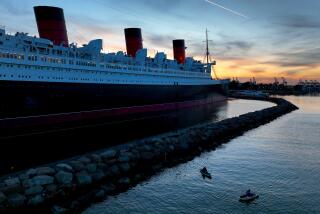Bid to Move Ship Is Torpedoed by Analysis of Costs
- Share via
LONG BEACH — The proposed transfer of the battleship Missouri from Long Beach to Pearl Harbor--an idea that set off a battle between congressmen from both states over possession of the historic ship--would cost taxpayers more than $46 million, according to a study released this week.
The report by the General Accounting Office, the investigative arm of Congress, concludes that it would be financially unwise to move the 58,000-ton ship from its home port in Long Beach, a transfer that would have dealt a multimillion-dollar blow to a city already damaged by layoffs stemming from defense cuts.
Although the transfer was approved by Congress a year ago over the protests of Long Beach officials, budget constraints seem to have made it impossible to build the wharf facilities and military housing necessary for Hawaii to accommodate the still-active ship and its 1,500 crew members.
“This confirms what I suspected--that our successful effort to keep the home port of the Missouri in Long Beach was of benefit both to Long Beach and the American taxpayer,” said Rep. Dana Rohrabacher (R-Long Beach), who requested the GAO analysis last year. “It now looks as if the Missouri will remain in Long Beach as long as it remains activated.”
It was just about a year ago that a deft maneuver by Hawaii’s Democratic Sen. Daniel K. Inouye swiped Mighty Mo out from under the noses of Long Beach lawmakers.
Using power politics some called brilliant, Inouye piloted through Congress an innocuous looking military construction bill that paved the way for the Missouri to move to Hawaii. The move was so coy that the bill never even mentioned the ship’s name.
The loss dealt a serious blow to the local economy, which profits from the presence of the ship and the paychecks spent by the Long Beach-based crew--not to mention the prestige of playing host to a floating hunk of history, upon whose decks the Japanese surrendered in World War II.
The Long Beach delegation was outraged. Rohrabacher asked for a congressional investigation into the taxpayer cost. But by most accounts, it looked as if the Missouri was a goner.
Then blew the winds of reform in Eastern Europe. The defense budget was pared lean. Two of Missouri’s sisters from the once-magnificent World War II fleet--the New Jersey and the Iowa--were put in mothballs, and the Missouri is facing the same prospect, possibly next year.
With little money for excesses, the congressional study underscores that a $46-million move is simply not affordable, Rohrabacher says. According to the report, it would cost $63.6 million to base the Missouri in Pearl Harbor, but just $17 million to keep it in Long Beach.
The issue still is not settled. A 1988 congressional report recommended that the Missouri be moved. The debate will doubtlessly flare again if Inouye decides to raise it, officials in Washington said.
But for the time being, Long Beach has a battleship, and that came as good news to City Hall.
Long Beach Councilman Warren Harwood said: “The payroll, the potential to keep the shipyard people working, it’s very, very good news. I never could understand the sense of moving it. It seems to me the tens of millions of dollars it would cost to move it could be better spent elsewhere.”
More to Read
Get the L.A. Times Politics newsletter
Deeply reported insights into legislation, politics and policy from Sacramento, Washington and beyond. In your inbox twice per week.
You may occasionally receive promotional content from the Los Angeles Times.










